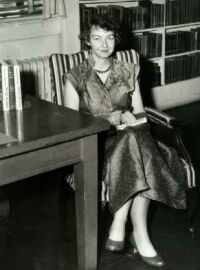The Fiction Writer And His Country

I just read “The Fiction Writer and His Country,” an essay by Flannery O'Connor that was originally contributed in 1957 to an anthology of contemporary authors writing about writing. It’s in Mystery and Manners, the collection of her prose.
She mentions an editorial in Life magazine that asked “Who speaks for America today?” The editorial said that no novelist working at that time did, because most novelists were pessimists who weren’t writing fiction uplifting enough to mirror the bliss that was postwar America. She felt that uplift wasn’t, of course, the job of a fiction writer. She is speaking below of Christian fiction writers, but her thoughts seemed also to speak to issues raised by the Times’ search for the Best American Novel of the Last 25 Years. How possible is it, really, to write a novel that speaks for everyone here? Should you even try? And if you didn’t try, but it ended up seeming like you had anyway, what would your book look like?
Also, see A Special Way of Being Afraid for a link to (and critique of) Laura Miller’s reasons for not voting. I agree with one of her points—I do think it’s easier to pick the best book of a given year, rather than the best book of a quarter-century. There’s less of a sense that you’re kingmaking. And it’s easier to do, because there’s so much crap pumped out in a given year, and the gold ends up shining brighter. Maybe?
Also, after reading O’Connor, I felt chastened for asking what America Philip Roth is speaking for—if he can make his own country of middle-aged misogynists live, which he seems to have done over and over again, then who am I to judge? Check back later, though, when the O’Connor has worn off.
What is such a writer going to take his country to be? The word usually used by literary folk in this connection would be “world,” but the word “country” will do; in fact, being homely, it will do better, for it suggests more. It suggests everything from the actual countryside that the novelist describes on to and through the peculiar characterisitcs of his region and his nation, and on, through, and under all of these to his true country, which the writer with Christian convictions will consider to be what is eternal and absolute. This covers considerable territory, and if one were talking of any other kind of writing than the writing of fiction, one would perhaps have to say “countries” but it is the peculiar burden of the fiction writer that he has to make one country do for all and that he has to evoke that one country though the concrete particulars of a life that he can make believeable….
The writer can choose what he writes about but he cannot choose what he is able to make live, and so far as he is concerned, a living deformed character is acceptable and a dead whole one is not….
To know oneself is to know one’s region. It is also to know the world, and it is also, paradoxically, a form of exile from that world. The writer’s value is lost, both to himself and to his country, as soon as he ceases to see that country as a part of himself, and to know oneself is, above all, to know what one lacks. It is to measure oneself against Truth, and not the other way around. The first product of self-knowledge is humility, and this is not a virtue conspicuous in any national character.

<< Home